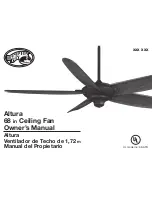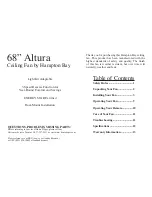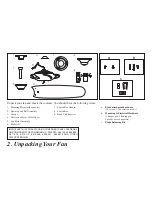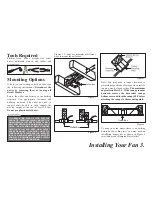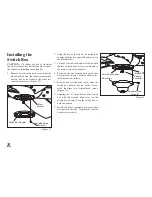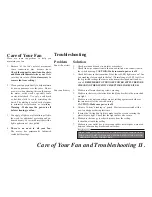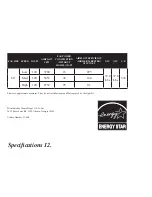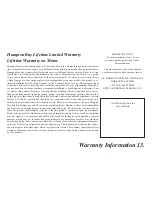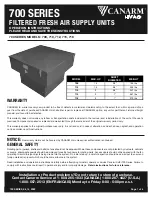
Care of Your Fan and Troubleshooting 11.
Care of Your Fan
Here are some suggestions to help you
maintain your fan.
Because of the fan’s natural movement,
1.
some connections may become loose.
Check the support connections, brackets,
and blade attachments twice a year
. Make
sure they are secure.
(It is not necessary to
remove fan from ceiling.)
Clean your fan periodically to help maintain
2.
its new appearance over the years. Do not
use water when cleaning, this could damage
the motor, or the wood or possibly cause
an electrical shock. Use only a soft brush
or lint-free cloth to avoid scratching the
finish. The plating is sealed with a lacquer
to minimize discoloration or tarnishing.
Warning - Make sure the power is off
before cleaning your fan.
You apply a light coat of furniture polish to
3.
the wood for additional protection and en-
hanced beauty. Cover small scratches with a
light application of shoe polish.
There is no need to oil your fan.
4.
The motor has permanently lubricated
sealed ball bearings.
MAKE SURE THE POWER IS OFF AT THE ELECTRICAL PANEL BOX BE-
FORE YOU ATTEMPT TO MAKE ANY REPAIRS. REFER TO THE SECTION,
“MAKING ELECTRICAL CONNECTIONS.”
Fan will not start
Fan sounds noisy
Check main and branch circuit fuses or breakers
1.
Check line wire connections to the fan and switch wire connections in
2.
the switch housing.
CAUTION: Make sure main power is off.
Check batteries in the transmitter. Does the red LED light come on? Are
3.
you standing close enough to the fan? (Normal range is 10-20 feet.) Are
the dip switch settings the same on the transmitter (hand unit) and re-
ceiver?
REMEMBER TO TURN OFF POWER SUPPLY BEFORE
CHECKING THE DIP SWITCH SETTINGS IN RECEIVER.
Make sure all motor housing screws are snug.
1.
Make sure the screws that attach the fan blade bracket to the motor hub
2.
are tight.
Make sure wire nut connections are not rattling against each other or
3.
the interior wall of the switch housing.
CAUTION: Make sure power is off.
Allow a 24-hour “breaking in” period. Most noises associated with a
4.
new fan disappear during this time.
If using the Ceiling Fan light kit, make sure the screws securing the
5.
glassware are tight. Check that the light bulb is also secure.
Make sure the canopy is a short distance from the ceiling.
6.
It should not touch the ceiling.
Make sure your outlet box is secure and rubber isolator pads were used
7.
between the mounting bracket and outlet box.
Troubleshooting
Problem Solution

